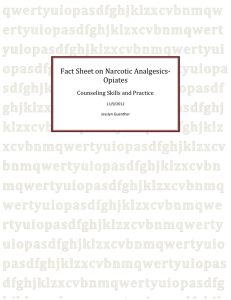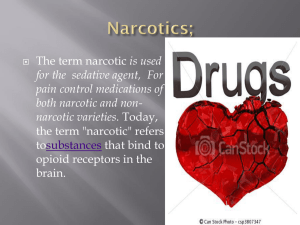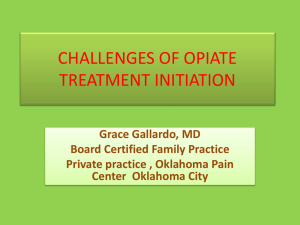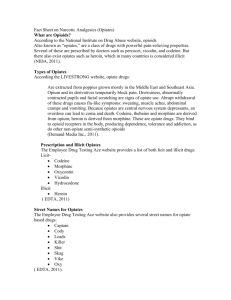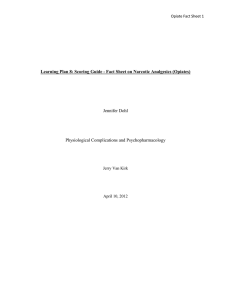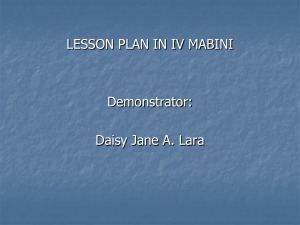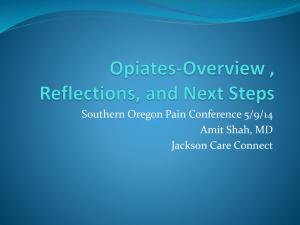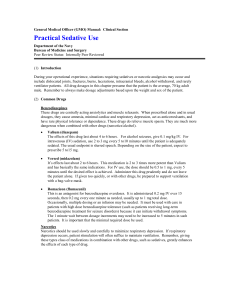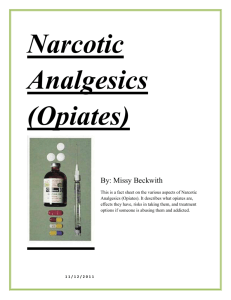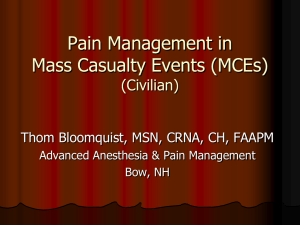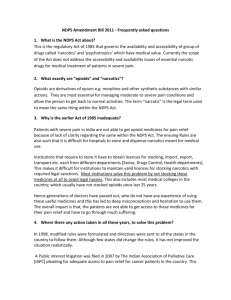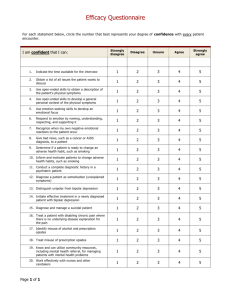Narcotic Analgesics fact sheet
advertisement
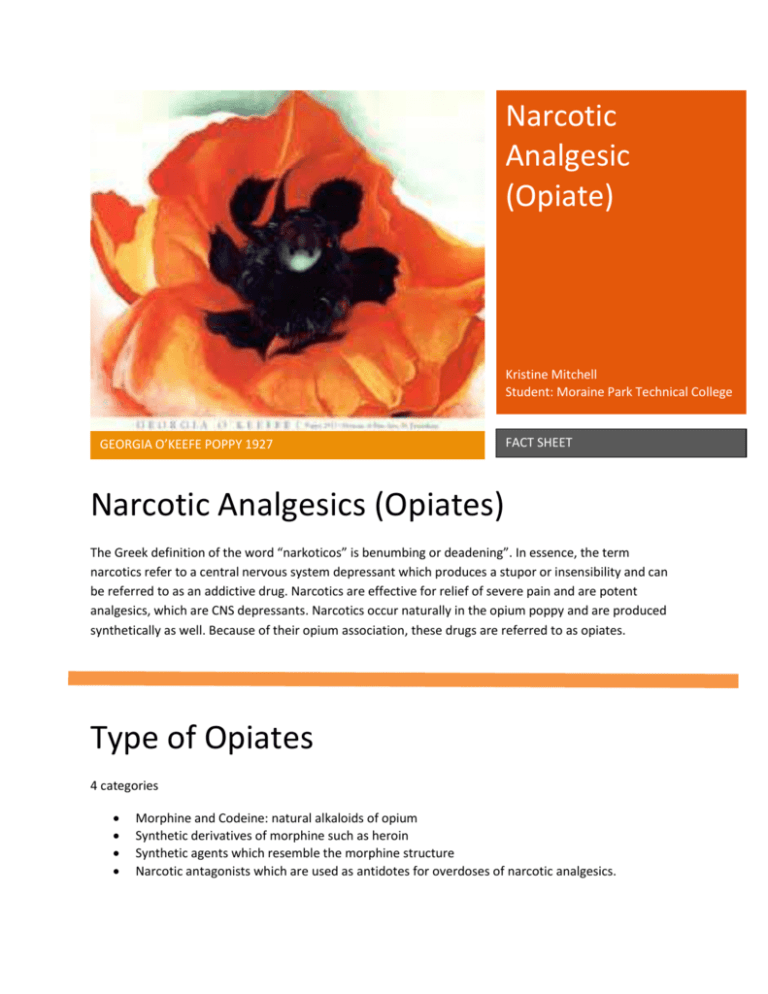
Narcotic Analgesic (Opiate) Kristine Mitchell Student: Moraine Park Technical College GEORGIA O’KEEFE POPPY 1927 FACT SHEET Narcotic Analgesics (Opiates) The Greek definition of the word “narkoticos” is benumbing or deadening”. In essence, the term narcotics refer to a central nervous system depressant which produces a stupor or insensibility and can be referred to as an addictive drug. Narcotics are effective for relief of severe pain and are potent analgesics, which are CNS depressants. Narcotics occur naturally in the opium poppy and are produced synthetically as well. Because of their opium association, these drugs are referred to as opiates. Type of Opiates 4 categories Morphine and Codeine: natural alkaloids of opium Synthetic derivatives of morphine such as heroin Synthetic agents which resemble the morphine structure Narcotic antagonists which are used as antidotes for overdoses of narcotic analgesics. Kristine Mitchell Opiate Fact Sheet List of opiates and Common Street Names Narcotic Drugs Heroin Common Names Black Tar Morphine Several Methadone Dolophine Meperidine Oxycodone Propoxyphene Codeine Demerol Percodan, OcyContin Darvon Several Loperamide Diphenoxylate Opium Tincture Imodium A-D Lomotil Paregoric Buprenorphine Fentanyls Suboxone Hydromorphone MPTP Street Name Brown sugar, H. Henry, horse, junk, skag, smack, black tar, tar, chiba or chiva, mud, dragon,dope, snowball, scat, number 3, nmber 4, number 8, white: china, nurse, lady, horse, girl, boy, stuff Dreamer, hows, M, Miss Emma, monkey, white stuff Frizzies, amidone, (with MDMA: chocolate chip cookies) Demmies, pain killer Oxy, O.C., oxycotton, hillbilly, oxycet, percs Captain cody, cody, schoolboy; (with glutethimide: doors & fours, loads, pancakes and syrup) Gods medicine, dopium, dream stick, glee, gum, joy plant Bupe, sub(s) China girl, dance fever, friend, goodfellas, king ivory, apache, china white, jackpot, murder 8, TNT, tango and cash Dillies, hydro, M2s, hospital heroin New heroin, MPPP, synthetic heroin, Host Common Uses Abuse Analgesia Treat narcotic dependence Analgesia Analgesia Analgesia Analgesia, antitussive Antidiarrheal Antidiarrheal Antidiarrheal Treat narcotic dependence Analgesic Analgesic, cough suppressant Tool to study Parkinson’s Kristine Mitchell Opiate Fact Sheet Pentazocine Tramadol Dextromethorphan Yellow footballs Analgesic Tram a dol, molly, TVMPP DXM, CCC, Triple c, Cough remedy skittles, robo, poor man’s PCP For a complete detailed list of opiate drugs see link: http://www.nida.nih.gov/PDF/RRHeroin.pdf Prescription opiates Morphine Methadone Meperidine Oxycodone Propoxyphene Codeine Loperamide Diphenoxylate Buprenorphine Fentanyls Hydromorphone Pentazocine Tramadol Dextromethorphan Illicit Opiates Heroin Designer type drugs like MPTP Therapeutic uses of prescription opiates Narcotic analgesics are most widely used as a pain reliever. Analgesics are effective in many types of pain including visceral (internal organs) and somatic (teeth, bones, skin, skeletal muscle), acute, surgical, non-surgical, chronic an oncogenic, and non-oncogenic. These drugs are used to treat the pain of cancer. Other uses of opioid narcotics are used as antitussives (suppress coughing), and diarrhea relief. Morphine is used in IHD, myocardial infarction, obstetric analgesia. Methadone as well as buprenorphine, and Suboxone is used in drug treatment to minimize withdrawal from other opiates like heroine. Anesthesia for surgery is induced with narcotic analgesics. MPTP is used as a research tool to study Parkinson’s disease. Naloxone/Naltrexon is used as an antidote in treating narcotic overdoses. Kristine Mitchell Opiate Fact Sheet Physiological effects from the abuse of opiates, both primary and secondary Narcotic drugs bind to the site where naturally occurring endorphin peptide transmitters are found. These transmitters are found in internal organs, intestines and the nervous system. Narcotics influences are widespread because of their stimulating effect directly to these opioid receptors. The first dose may elicit a feeling of euphoria and will encourage continued use. It dulls pain of either the physical or mental type. However, nausea and sleepiness can occur upon initial use. A side effect of opioid narcotics that is very common is constipation. Respiratory depression, constriction of pupils, vomit, inability to urinate, mental clouding, itching, and blood pressure drop are other side effects of narcotics. Because of the pleasant effects of narcotics, an individual may be encouraged to keep using. The user then must continue using in order to avoid withdrawal symptoms. This is referred to as “the monkey is on his back” (Hanson, p. 264). By avoiding withdrawal symptoms the individual is already developing tolerance. Using frequently, it takes about 2 to 3 weeks to develop tolerance. Physiological dependence makes it difficult for an individual to stop using narcotics. Withdrawal effects from opiates Withdrawal symptoms can be agitation, stomach cramps, exaggerated pain responses, muscle aches, flu symptoms, vomiting, anxiety, and runny nose. In addition, artificial depression can periodically be produced which disappears upon repetition of the dosage. An individual who is experiencing withdrawal from opioid narcotics will undergo a series of unpleasant symptoms from agitation, sleep, cold and hot flashed and more agitation. This peaks between 48 and 72 hours following the last dose of the drug taken. Risks of the abuse of opiates Kristine Mitchell Opiate Fact Sheet Risks of abuse of opiates can include: fatal overdose, infectious diseases like hepatitis or HIV/AIDS, and collapsed veins. In addition, mental functioning can become clouded that can cause accidents when using heavy machinery. Using opiates during pregnancy can cause spontaneous abortion, low birth weight, and lack of prenatal care. An infant can be born addicted to narcotics if the mother is using and the infant will experience painful withdrawal symptoms if not treated. Impurities in some opiate like heroine can be an issue. Sometimes heroine is cut with Quinine, which can cause vascular damage, heartbeat disturbances, coma, depression in reparation, and death. In addition, the variance in purity can cause overdose if the individual user is not aware of its strength. Some designer opiates like fentanyl’s have high potency and can cause fatal respiratory depression. MPTP, another designer form of narcotics, can cause Parkinson’s symptoms. Treatment approaches to opiate abuse and dependence Treatment modalities for opiate abuse include medications like, buprenorphine, Suboxone, methadone. These medications suppress withdrawal effects and help detoxify an individual and pave the way to continue with behavioral treatments. Rapid detox is another medication oriented treatment that uses naltrexone under anesthesia to rapidly eliminate opiate drugs from the system. These detoxifying treatments are only the first step in the process of treatment for opiate abuse. Once detoxification is under control, the individual is ready to engage in modification of behaviors and attitudes related to drug abuse. There are different behavioral treatments that include multidimensional family therapy, motivational interviewing, cognitive-behavioral therapy, and motivational incentives. These treatments include individual or group drug counseling. In resident treatment programs are also available for the opiate dependent individual. Typically these individuals will remain in residential treatment from 6 to 12 months and a community based approach to recovery is a key element of change. Kristine Mitchell Opiate Fact Sheet References http://www.hopkins-arthritis.org/patient-corner/drugforms/narcotics.pdf by Supporting Research on Prescription Pain Pill Addiction on Monday, December 6, 2010 at 3:01pm http://addictionscience.net/ASNdrugs.htm#OpiateClass http://drugsandwholeperson.tripod.com/id15.html http://anesthesiageneral.com/therapeutic-uses-of-opioid-analgesics/ http://www.drugtext.org/library/books/adopiates/chapter2.htm http://www.homedrugtestingkit.com/opiates.html http://drugabuse.gov/DrugPages/PrescripDrugsChart.html http://www.casapalmera.com/articles/nicknames-street-names-and-slang-for-heroin/ http://www.soberrecovery.com/alcoholdrugtreatment/article/drug-street-names/opium.html http://www.urbandictionary.com/define.php?term=hydromorphone http://www.nida.nih.gov/infofacts/treatmeth.html
